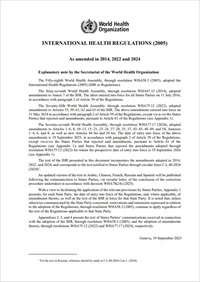World Health Organization (WHO) epidemiologist Marie-Roseline Darnycka Bélizaire on a MONUSCO helicopter flight between Beni and Butembo in the Democratic Republic of the Congo (DRC) on 1 January 2019.
International Health Regulations
While disease outbreaks and other acute public health risks and events are often unpredictable and require a range of responses, the International Health Regulations (2005) (IHR) provide an overarching legal framework that defines States Parties’ (countries’) rights and obligations in managing public health risks, events and emergencies that have the potential to cross borders.
The IHR are an instrument of international law that is legally-binding on 196 countries, including the 194 WHO Member States. They establish rights and obligations for countries, including the requirement to designate or establish Responsible Authorities; establish and maintain core capacities for surveillance and response, as well as at points of entry; notify to WHO public health risks and events with actual or potential international public health implications, regardless of their origin or source; verify information of public health risk and events of which WHO has become aware through informal and unofficial sources.
The IHR set forth the obligation for WHO to maintain the global public health early warning function and to coordinate international response efforts.
Additional provisions address the areas of international traffic, such as health documents for international travelers and conveyances on an international voyage. The IHR include important safeguards to protect individual rights in relation to the treatment of personal data, informed consent and non-discrimination in the application of health measures under the Regulations.
The purpose and scope of the International Health Regulations (2005) (IHR) are to prevent, prepare for, protect against, control and provide a public health response to the international spread of disease in ways that are commensurate with and restricted to public health risk and which avoid unnecessary interference with international traffic and trade.
The responsibility for implementing the IHR rests upon all States Parties, across government sectors, and on WHO.
The IHR require that all countries have capacity to:
- prevent public health risks and events;
- detect acute public health risks and events in timely matter;
- assess acute public health risks and events guided by Annex 2 of the IHR;
- report public health risks and events to WHO, through the National IHR Focal Points those that may constitute a public health emergency of international concern; and
- respond to public health risks, events, and emergencies.
The IHR require WHO to:
- maintain the global public health early warning function – through global surveillance and information sharing;
- coordinate international response efforts;
- upon countries’ request, support them in capacity building and response efforts; and
- ensure secretariat-like functions.
To support countries in strengthening and maintaining their capacities for ensuring rapid detection, verification and response to public health risks, WHO develops and provides tools, guidance and training.
WHO’s support focuses on the priority needs identified by the WHO Regional and Country Offices, in order to help each country meet its IHR commitment. This includes:
- designating WHO IHR Contact Points at the headquarters or the regional level;
- conducting global public health surveillance and assessment of significant public health events;
- disseminating public health information to Member States;
- offering technical assistance to Member States;
- supporting Member States in their efforts to assess their existing national public health structures and capacities for surveillance and response, including at designated points of entry;
- monitoring the implementation of IHR (2005) and updating guidelines; and
- if required, determining whether or not a particular event constitutes a public health emergency of international concern (PHEIC), with advice from external experts.
If a PHEIC is declared, WHO develops and recommends the critical health measures for implementation by Member States during such an emergency.




/wha77_committee_a.tmb-549v.jpg?sfvrsn=9a7971d6_1)

